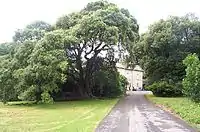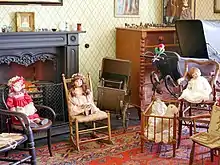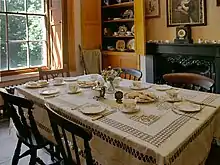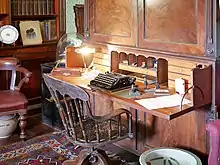Scolton Manor
Scolton Manor is a Victorian country house and country park located in Pembrokeshire, West Wales northeast of Haverfordwest and on the borders of the Pembrokeshire Coast National Park. Built as a home, it is now a museum and is a Grade II* listed building. The stable court, some 120 m (130 yd) to the north, is also a Grade II listed building[1] and both are owned by Pembrokeshire County Council.[2][3] The house, grounds and a number of exhibits are open to the public.

History
Designed by local architects William and James Owen, Scolton Manor was built in 1840[4] and occupied from 1842 by the Higgon family. The house replaced a former building owned by the same family which had burned down in the mid-eighteenth century. Prominent amongst Pembrokeshire society, three Higgon family members held the position of High Sheriff of Pembrokeshire, including the last resident, Lt Col John Henry Victor Higgon (1902-1987).[5][6][7] It is a country house built in a neo-classical style, with unpainted stucco, with a slated, hipped roofs and flat overhanging eaves.[2]
Taken over by Pembrokeshire County Council, the grounds have become a country park and the house has been restored. Both are open to the public. Scolton Manor is home to Pembrokeshire's County Museum Service.[8]
Exhibitions
House and outbuildings



The exhibition hall displays the broad-ranging history of Pembrokeshire including natural history, geology, employment and trade, life during World War II and the Gwalia stores. The David Burton-Richardson Collection and Archive of paintings, drawings and artefacts relating to the artist's life is housed at Scolton Manor Museum. "From Now to Zero", a retrospective exhibition of David Burton-Richardson's works was held in 2005.
The outbuildings display collections reflecting Pembrokeshire country life, including stables and carriages,[4][9] the traditional skills of carpenter and blacksmith, the relationship between the poacher and gamekeeper and a Gulbenkian-nominated VARDA gypsy caravan.
Grounds
The grounds include a Victorian walled garden, the Pembrokeshire Beekeeping Centre, opened in July 2014 at the same time as the inauguration of the walled garden,[10] a pineapple house, which in 2018 produced what is believed to be the first pineapple grown in Wales for over 100 years[11] and Margaret, a Fox Walker & Co 0-6-0 locomotive supplied to the Maenclochog and Rosebush railway in 1878.[4]
References
- Cadw. "Scolton Manor Stable Court (Grade II) (25067)". National Historic Assets of Wales. Retrieved 18 July 2019.
- "Scolton Manor, Spittal Date Listed: 13 December 1951 Cadw Building ID: 11984". British Listed Buildings. Retrieved 9 April 2016.
- Cadw. "Scolton Manor (Grade II*) (11984)". National Historic Assets of Wales. Retrieved 18 July 2019.
- David Kemp (1992). The Pleasures and Treasures of Britain: A Discerning Traveller's Companion. Dundurn. p. 217. ISBN 978-1-55488-347-9.
- "No. 25922". The London Gazette. 9 March 1889. p. 2009.
- "No. 39175". The London Gazette. 16 March 1951. p. 1429.
- "No. 33700". The London Gazette. 20 March 1931. p. 1878.
- "Cultural Services Pembrokeshire: Museum Service". Retrieved 31 October 2018.
- Catherine Le Nevez; Paul Whitfield (2012). The Rough Guide to Wales. Rough Guides Limited. p. 177. ISBN 978-1-4093-5902-9.
- "County's beekeeping centre opens". Tivyside Advertiser. 25 July 2014. Retrieved 5 August 2014.
- "First pineapple grown for 100 years in Welsh hothouse". BBC News. 3 September 2018. Retrieved 3 September 2018.
External links
| Wikimedia Commons has media related to Category:Scolton Manor. |
